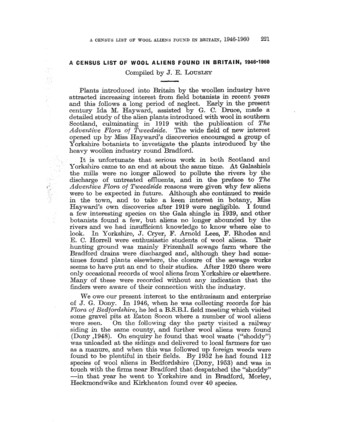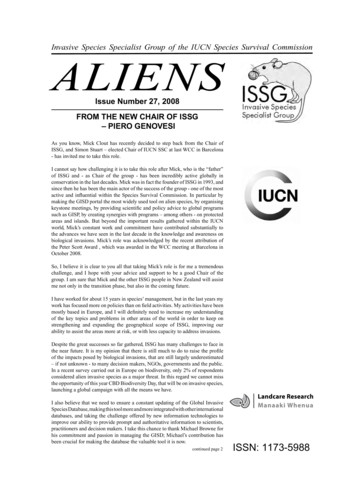Aliens' Right To Counsel In Removal Proceedings: In Brief
Aliens’ Right to Counsel in RemovalProceedings: In BriefKate M. ManuelLegislative AttorneyMarch 17, 2016Congressional Research Service7-5700www.crs.govR43613
Aliens’ Right to Counsel in Removal Proceedings: In BriefSummaryThe scope of aliens’ right to counsel in removal proceedings is a topic of recurring congressionaland public interest. This topic is complicated, in part, because the term right to counsel can referto either (1) the right to counsel of one’s own choice at one’s own expense, or (2) the right ofindigent persons to counsel at the government’s expense. A right to counsel can also arise frommultiple sources, including the Fifth and Sixth Amendments to the U.S. Constitution, theImmigration and Nationality Act (INA), other federal statutes, and federal regulations. Further, insome cases, courts have declined to recognize a categorical right to counsel, applicable to allaliens in removal proceedings, but have opined that individual aliens could have a right to counselat the government’s expense on a case-by-case basis because of their specific circumstances.Right to Counsel at the Alien’s Expense. The Fifth Amendment to the U.S. Constitution hasgenerally been construed to mean that aliens have a right to counsel at their own expense informal removal proceedings. The Fifth Amendment guarantees that “[n]o person . shall bedeprived of life, liberty, or property” without due process of law. Aliens—including those whohave entered or remained in the United States in violation of federal immigration law—have beenfound to be encompassed by the Fifth Amendment’s usage of “person,” and removal can be seenas implicating an alien’s interest in liberty. Thus, courts have historically viewed access tocounsel at one’s own expense as required to ensure “fundamental fairness” in formal removalproceedings. While then-Attorney General Mukasey’s 2009 decision in Matter of Compeanexpressed doubt about the Fifth Amendment basis for aliens’ right to counsel at their ownexpense, this decision was subsequently vacated later in 2009 by then-Attorney General Holder.Various federal statutes and regulations also provide aliens (other than those in expedited removalproceedings under Section 235 of the INA) with a right to counsel at their own expense. Some ofthese provisions refer to such counsel as a “privilege.” However, the provisions have generallybeen construed as conferring a legally enforceable right.Right to Counsel at the Government’s Expense. Aliens, as a group, generally do not have aright to counsel at the government’s expense in administrative removal proceedings under eitherthe Sixth Amendment or the INA. The Sixth Amendment’s “right to . have the Assistance ofCounsel” at government expense, in the case of indigent persons, applies to criminal proceedings.Removal proceedings, in contrast, are civil in nature (although aliens subject to judicial orders ofremoval could be seen to have a Sixth Amendment right to counsel in the criminal proceedingsthat result in such orders). Similarly, the INA and its implementing regulations do not purport toprovide a right to appointed counsel for any aliens except those removed by the Alien TerroristRemoval Court, which has not been used to date.Individual aliens could, however, potentially be found to have a right to counsel at thegovernment’s expense on other grounds, depending upon the facts and circumstances of the case.Several federal courts of appeals have suggested that the Fifth Amendment’s guarantee of dueprocess could require the appointment of counsel on a case-by-case basis for individual alienswho are incapable of representing themselves due to “age, ignorance, or mental capacity,”although it is unclear whether any alien has been provided with appointed counsel on this basis todate. In addition, Section 504 of the Rehabilitation Act has been construed to require theappointment of “qualified representatives” for aliens who are “mentally incompetent” to representthemselves in removal proceedings. These representatives may be pro bono, or appointed atgovernment expense, and they can include licensed attorneys as well as persons who are notattorneys.Congressional Research Service
Aliens’ Right to Counsel in Removal Proceedings: In BriefContentsRight to Counsel at the Alien’s Expense . 2Fifth Amendment . 2INA and Other Provisions of Immigration Law . 3Right to Counsel at the Government’s Expense . 6Sixth Amendment . 6INA and Other Provisions of Immigration Law . 7Fifth Amendment . 8Rehabilitation Act. 10ContactsAuthor Contact Information . 11Congressional Research Service
Aliens’ Right to Counsel in Removal Proceedings: In Briefhe scope of aliens’ right to counsel in removal proceedings (i.e., proceedings to removethem from the United States) is a topic of recurring congressional and public interest. Thistopic is complicated, in part, because the term right to counsel can refer to either (1) theright to counsel of one’s own choice at one’s own expense, or (2) the right of indigent persons tocounsel at the government’s expense. A right to counsel can also arise from multiple sources,including the Fifth and Sixth Amendments to the U.S. Constitution, the Immigration andNationality Act (INA), other federal statutes, and federal regulations. Further, in some cases,courts have declined to recognize a categorical right to counsel, applicable to all aliens in removalproceedings, but have opined that individual aliens could have a right to counsel at thegovernment’s expense on a case-by-case basis because of their specific circumstances. Inaddition, federal, state, and local governments may provide counsel to aliens in circumstanceswhere they have not been seen as having a legal right to counsel.1TAs used here, the term removal proceeding refers to formal proceedings before an immigrationjudge under Section 240 of the INA.2 There are other types of proceedings that can result in analien being removed from the United States—most notably, expedited removal under Section 235of the INA.3 However, insofar as these other types of proceedings may involve aliens who havefew, if any, ties to the United States, the aliens subject to them could be seen to lack constitutionalor statutory rights to counsel,4 and thus this report does not address these other forms of removalproceedings.This report provides an overview of the various legal authorities governing aliens’ right tocounsel—as that term is broadly understood—in removal proceedings. It does not address aliens’right to counsel in criminal proceedings, the outcomes of which could potentially affect their1See, e.g., Corp. for Nat’l & Cmty. Serv., 2015 Justice AmeriCorps Notice of Funding Opportunity, available americorps-noticefunding (noting the availability of approximately 2 million in grant funds for the second year of a program to providelegal representation to certain unaccompanied alien children (UAC) facing removal proceedings); CAL. WEL. & INS’TCODE §13300(a) (2016) (“Subject to the availability of funding in the act that added this chapter or the annual BudgetAct, the department shall contract . with qualified nonprofit legal services organizations to provide legal services tounaccompanied undocumented minors who are transferred to the care and custody of the federal Office of RefugeeResettlement and who are present in this state.”).2See 8 U.S.C. §1229a.3See generally 8 U.S.C. §1225.4See, e.g., United States v. Barajas-Alvarado, 655 F.3 1077, 1088 (9th Cir. 2011) (“Barajas-Alvarado himself identifiesno legal basis for his claim that non-admitted aliens who have not entered the United States have a right torepresentation . The cases cited by Barajas-Alvarado involve aliens in the more formal removal proceedings, wherethe regulations provide a right of counsel, as compared to expedited removal proceedings, where they do not.Because non-admitted aliens are entitled only to whatever process Congress provides, . Barajas-Alvarado’s lack ofrepresentation in the removal proceeding did not constitute a procedural error at all, let alone a due process violation.”);United States v. Garcia-Villa, No. 14CR1481WQH, 2014 U.S. Dist. LEXIS 139854, at *10 (S.D. Cal., September 30,2014) (“No statutory or regulatory provision of the expedited removal proceedings [under Section 235 of the INA]provides a right to consult with counsel. Defendant Garcia was a non-admitted alien at the time of his expeditedremoval proceedings and ‘non-admitted aliens are entitled to only whatever process Congress provides.’”). Somecommentators have suggested, however, that aliens subject to expedited removal under Section 235 of the INA have astatutory right to counsel at their own expense under the Administrative Procedure Act (APA) on the grounds that theAPA creates an “entitlement” to counsel for persons “compelled to appear in person before an agency or representativethereof.” See generally Emily Creighton & Robert Pauw, Right to Counsel Before DHS, available iles/docs/lac/Right-to-Counsel-Article.pdf (last accessed March 3,2016). This argument is outside the scope of this report, since this report focuses on “formal” removal proceedingsunder Section 240 of the INA.Congressional Research Service1
Aliens’ Right to Counsel in Removal Proceedings: In Briefability to remain in the United States under immigration law.5 The report also does not addresseffective assistance of counsel.6Right to Counsel at the Alien’s ExpenseAliens have generally been seen as having both constitutional and statutory rights to counsel attheir own expense in formal removal proceedings. The constitutional right is grounded in theFifth Amendment’s guarantee of due process, while the statutory right arises from the INA andrelated provisions of immigration law. The regulations implementing these statutory provisionsfurther establish these and other rights pertaining to counsel in removal proceedings.Fifth AmendmentThe Fifth Amendment guarantees that “[n]o person . shall be deprived of life, liberty, orproperty” without due process of law.7 Aliens—including those who have entered or remained inthe United States in violation of federal immigration law—have been found to be encompassedby the Fifth Amendment’s usage of “person,”8 and removal can be seen as implicating an alien’sinterest in liberty.9 Thus, courts have historically viewed access to counsel at one’s own expenseas required to ensure “fundamental fairness” in formal removal proceedings.10 For example, inLeslie v. Attorney General, the U.S. Court of Appeals for the Third Circuit (Third Circuit) noted5See, e.g., INA §237(a)(2)(A)(ii), 8 U.S.C. §1227(a)(2)(A)(ii) (aliens who are convicted of two or more “crimesinvolving moral turpitude”, not arising from a single scheme of criminal conduct, at any time after admission aredeportable); INA §240A(a), 8 U.S.C. §1229b(a) (cancellation of removal may not be granted to otherwise eligiblelawful permanent resident (LPR) aliens who have been convicted of “aggravated felonies”).6See generally CRS Report R41190, Ineffective Assistance of Counsel: Deportation Consequences of Guilty Pleas, byLarry M. Eig; Thomas K. Ragland, The Right to Effective Assistance of Counsel in Immigration Proceedings, Am. BarAssoc., available at immigration/articles/0609 ragland.html (lastaccessed March 3, 2016).7U.S. Const., amend. V.8Reno v. Flores, 507 U.S. 292, 306 (1993) (“It is well established that the Fifth Amendment entitles aliens to dueprocess of law in deportation proceedings.”); Landon v. Plasencia, 459 U.S. 21 (1982) (recognizing certain aliens’ rightto due process in exclusion proceedings, a predecessor of contemporary removal proceedings that applied to aliensseeking to enter the United States); Kwong Hai Chew v. Colding, 344 U.S. 590, 596 (1953) (recognizing aliens’ rightto due process in deportation proceedings, another predecessor of removal proceedings that applied to aliens within theUnited States, regardless of whether they were lawfully present); Yamataya v. Fisher, 189 U.S. 86, 101 (1903) (alienswho have “become subject in all respects to [the] jurisdiction [of the United States], and a part of its population,” areentitled to due process in removal proceedings, even if they are “alleged to be illegally here”). In 1996, Congresscreated a new unified proceeding known as removal, combining exclusion and deportation proceedings into one.9See, e.g., Bridges v. Wixon, 326 U.S. 135, 154 (1945) (“[Because removal] visits a great hardship on the individualand deprives him of the right to stay and live and work in this land of freedom[,] . meticulous care must be exercisedlest the procedure by which [an alien] is deprived of that liberty not meet the essential standards of fairness.”). Incertain cases, removal proceedings also implicate a liberty interest in being free from detention because the INArequires that aliens be held pending the issuance of a final order of removal, or pending the execution of such a removalorder. See, e.g., Zadvydas v. Davis, 533 U.S. 678, 690 (2001); Ly v. Hansen, 351 F.3d 263, 269 (6 th Cir. 2002).10See, e.g., Biwot v. Gonzales, 403 F.3d 1094, 1098 (9th Cir. 2005) (“The right to counsel in immigration proceedingsis rooted in the Due Process Clause.”); Dakane v. U.S. Attorney General, 399 F.3d 1269, 1273 (11 th Cir. 2005) (“It iswell established in this Circuit that an alien in civil deportation proceedings . has the constitutional right under theFifth Amendment Due Process Clause . to a fundamentally fair hearing.”); Borges v. Gonzales, 402 F.3d 398, 408 (3dCir. 2005) (“The Fifth Amendment entitles aliens to due process of law in deportation proceedings.”); Rosales v.Bureau of Immigr. & Customs Enforcement, 426 F.3d 733, 736 (5th Cir. 2005) (“[D]ue process requires thatdeportation hearings be fundamentally fair.”); Brown v. Ashcroft, 360 F.3d 346, 350 (2d Cir. 2004) (“The right .under the Fifth Amendment to due process of law in deportation proceedings is well established.”).Congressional Research Service2
Aliens’ Right to Counsel in Removal Proceedings: In Briefthat “although the Fifth Amendment does not mandate government-appointed counsel for aliensat removal proceedings, it indisputably affords an alien the right to counsel of his or her ownchoice at his or her own expense.”11 Similarly, in United States v. Charleswell, the Third Circuitdescribed aliens’ right to counsel at their own expense in formal removal proceedings as “sofundamental to the proceeding’s fairness” that a denial of this right could “rise to the level offundamental unfairness.”12 Aliens’ Fifth Amendment right to counsel at their own expense hasalso been seen as underlying the INA’s provisions granting aliens a right to counsel at their ownexpense,13 discussed below, although courts have generally treated actions that deprive aliens ofcounsel at their own expenses as violating the statute, not the Constitution.14Then-Attorney General Mukasey departed from this general view in his 2009 decision in Matterof Compean, finding that aliens have no Fifth Amendment right to counsel at their own expensein removal proceedings.15 This finding formed, in part, the basis for his articulation of a newstandard for assessing claims of ineffective assistance of counsel in removal proceedings,16 sincealiens cannot be said to have a constitutional right to effective assistance of counsel in removalproceedings if they lack any constitutional right to counsel in these proceedings.17 However, thisdecision was vacated later in 2009 by then-Attorney General Holder.18 Mr. Holder’s decision inMatter of Compean is primarily concerned with the standards for assessing claims of ineffectiveassistance of counsel in removal proceedings,19 but the vacatur apparently encompasses Mr.Mukasey’s findings about aliens’ Fifth Amendment right to counsel at their own expense.INA and Other Provisions of Immigration LawVarious provisions of the INA and other immigration-related statutes, as well as theirimplementing regulations, provide aliens with a right to counsel at their own expense in removalproceedings. Section 292 of the INA generally governs aliens’ right to counsel, and provides that,In any removal proceedings before an immigration judge and in any appeal proceedingsbefore the Attorney General from any such removal proceedings, the person concerned11611 F.3d 171, 181 (3d Cir. 2010).456 F.3d 347, 360 (3d Cir. 2006).13See, e.g., Leslie, 611 F.3d 171, 180-181 (“[Aliens’] statutory and regulatory right to counsel is also derivative of thedue process right to a fundamentally fair hearing.”); Castaneda-Delgado v. INS, 525 F.2d 1295, 1302 (7th Cir. 1975)(characterizing the INA’s provisions regarding the right to counsel as “an integral part of the procedural due process towhich the alien is entitled”).14See “Right to Counsel at the Alien’s Expense: INA and Other Provisions of Immigration Law.”1524 I. & N. Dec. 710, 726 (A.G. 2009) (“The fact that aliens in removal proceedings have a statutory privilege toretain counsel of their choosing at no expense to the Government . does not change the constitutional analysis,because a statutory privilege is not the same as a right to assistance of counsel, including Government-appointedcounsel, under the Constitution.”). Decisions by the Board of Immigration Appeals (BIA)—the highest administrativetribunal for interpreting and applying immigration law—may be certified to the Attorney General for his review,resulting in decisions such as that in Matter of Compean. See generally 8 C.F.R. §1003.1(h)(1)(i)-(iii).1624 I. & N. Dec. at 732-739.17Id. at 729 (“[T]here is no valid basis for finding a constitutional right to counsel in removal proceedings, and thus novalid basis for recognizing a constitutional right to effective assistance of privately retained lawyers in suchproceedings.”).1825 I. & N. Dec. 1 (A.G. 2009).19Id. at 2 (directing the Executive Office for Immigration Review (EOIR) to initiate rulemaking procedures “as soon aspracticable” to determine the appropriate standard for assessing claims of ineffective assistance of counsel in removalproceedings). As of the date of this report, no such regulations have been promulgated.12Congressional Research Service3
Aliens’ Right to Counsel in Removal Proceedings: In Briefshall have the privilege of being represented (at no expense to the Government) by suchcounsel . as he shall choose.20However, other provisions of the INA or related statutes address the rights of particular categoriesof aliens (e.g., children),21 or aliens’ rights in particular types of removal proceedings (e.g.,expedited removal under Section 238 of the INA).22 These statutory provisions also afford alienscertain other rights as to counsel in removal proceedings. Specifically, they (1) imposerestrictions upon when hearings in removal proceedings may be held, so as to permit aliens theopportunity to obtain counsel;23 (2) require that aliens against whom removal proceedings havebeen initiated be furnished with lists of persons available for pro bono representation;24 and (3)establish additional protections for classes of aliens who are seen as particularly “vulnerable”(e.g., unaccompanied minors, “mentally incompetent” individuals).25 Many of these statutoryprovisions describe aliens’ retention of counsel at their own expense as a “privilege.”26 However,20See 8 U.S.C. §1362.See, e.g., 8 U.S.C. §1232(c)(5) (“The Secretary of Health and Human Services shall ensure, to the greatest extentpracticable and consistent with section 292 of the [INA] ., that all unaccompanied alien children who are or have beenin the custody of the Secretary or the Secretary of Homeland Security, and who are not nationals or habitual residentsof countries contiguous with the United States, have counsel to represent them in legal proceedings or matters andprotect them from mistreatment, exploitation, and trafficking.”); INA §240(b)(3), 8 U.S.C. §1229a(b)(3) (“If it isimpracticable by reason of an alien’s mental incompetency for the alien to be present at the proceeding, the AttorneyGeneral shall prescribe safeguards to protect the rights and privileges of the alien.”). Among other things, thesafeguards for “mentally incompetent” aliens (1) call for service of the Notice to Appear (NTA) initiating removalproceedings upon near relatives, guardians, or friends of the alien, 8 C.F.R. §103.8(c)(2); 8 C.F.R. §236.2(a); (2) permitattorneys, legal representatives and guardians, and family and friends of the alien to appear on the alien’s behalf inremoval proceedings, 8 C.F.R. §1240.4; and (3) bar immigration judges from accepting admissions of removabilityfrom unrepresented respondents who are “incompetent” absent certain assistance from third parties, 8 C.F.R.§1240.10(c).22See, e.g., INA §208(d)(4), 8 U.S.C. §1158(d)(4) (requiring that applicants for asylum be advised of the “privilege” ofbeing represented by counsel and given a list of persons who can provide pro bono representation); INA §238(b)(4)(B),8 U.S.C. §1228(b)(4)(B) (providing that aliens convicted of aggravated felonies who are subject to expedited removalunder Section 238 of the INA shall “have the privilege of being represented (at no expense to the government) by suchcounsel . as the alien shall choose.”). Expedited removal under Section 238 is distinct from expedited removal underSection 235. See supra note 4 and accompanying text.23See, e.g., INA §239(b)(1), 8 U.S.C. §1229(b)(1).24See, e.g., INA §239(b)(2), 8 U.S.C. §1229(b)(2) (general requirement); 8 C.F.R. §238.1(b)(2)(iv) (requirement as toaliens convicted of aggravated felonies who are facing “expedited removal” under Section 238 of the INA).25See, e.g., 6 U.S.C. §279(b)(1)(A) (requiring the Office of Refugee Resettlement (ORR) at the Department of Healthand Human Services to develop a plan to “ensure that qualified and independent legal counsel is timely appointed torepresent the interests of each such child, consistent with the law regarding appointment of counsel that is in effect onNovember 25, 2002”). Despite the reference to the “appointment” of counsel, this provision has generally not beenconstrued to require that unaccompanied alien children (UAC) receive counsel at the government’s expense becausesuch representation is to be “consistent with the law regarding appointment of counsel that is in effect on November 25,2002,” and the INA at that time generally provided only for aliens’ right to counsel at their own expense. ORR soughtto meet this mandate by contracting with the Vera Institute of Justice in 2005 to develop and test ways to provide legalrepresentation to UAC. See Shani M. King, Alone and Unrepresented: A Call to Congress to Provide Counsel forUnaccompanied Minors, 5 HARV. J. LEG. 332, 340 (2013). The Institute, in turn, oversees programs at 26 nonprofitagencies that provide legal assistance to UAC throughout the country. Vera Institute for Justice, UnaccompaniedChildren Program, available at -program (last accessed February26, 2016). Among other things, these agencies make presentations about legal rights at local detention facilities beforeUAC’s first court appearance, conduct individual screenings to identify UAC’s legal needs and furnish information,and provide pro bono assistance and referrals. Id. For more on the protections for “mentally incompetent” individuals,see supra note 21.26See, e.g., INA §208(d)(4), 8 U.S.C. §1158(d)(4); INA §292, 8 U.S.C. §1362. But see Castro-O’Ryan v. INS, 847F.2d 1307, 1312 (9th Cir. 1982) (noting that the captions of some provisions refer to a “Right to Counsel”).21Congressional Research Service4
Aliens’ Right to Counsel in Removal Proceedings: In Briefthe implementing regulations are drafted so as to suggest that there is a legal right to counsel atthe alien’s expense,27 and numerous courts have construed the INA as establishing a statutoryright to counsel at the alien’s expense.28These and other courts have generally viewed aliens’ statutory right to counsel at their ownexpense as satisfied if the immigration judge inquires whether the alien wishes counsel, gives anyalien wishing counsel a reasonable period of time in which to obtain it, and determines that anywaivers of this right are knowing and voluntary.29 On the other hand, violations of aliens’ right tocounsel at their own expense have been found in specific circumstances where (1) the alien wasnot advised of his/her due process rights, including the right to counsel, in a language s/he couldunderstand;30 (2) the alien was transferred to a remote facility without notice to his/her attorney;31(3) the government exercised “unexplained” haste in beginning removal proceedings;32 (4) thealien was prevented from consulting with counsel prior to signing a voluntary departure form;33(5) the alien was denied access to basic written legal materials;34 and (6) the alien was denied achange of venue to allow the retention of counsel.35 Courts in some jurisdictions have, however,found that violations of aliens’ statutory right to counsel at their own expense are not, inthemselves, grounds for reopening removal proceedings or otherwise permitting the alien to relitigate his/her removability or eligibility for relief from removal. 36 Instead, courts in thesejurisdictions have generally required that aliens show that any violation of their statutory rightswas “prejudicial” in that the outcome of the proceeding could have been different absent theviolation.37 For example, in United States v. Reyes-Bonilla, the U.S. Court of Appeals for theNinth Circuit found that an alien was not entitled to have his conviction for violating 8 U.S.C.§1326 (being a deported alien found in the United States without permission) overturned due to aviolation of his statutory rights because he could not show the requisite prejudice resulting from27See, e.g., 8 C.F.R. §292.5(b) (“Whenever an examination is provided for in this chapter, the person involved shallhave the right to be represented by an attorney or representative.”); 8 C.F.R. §1240.10(a)(1) (“In a removal proceeding,the immigration judge shall . [a]dvise the respondent of his or her right to representation at no expense to thegovernment, by counsel of his or her choice.”).28See supra note 11; Castro-O’Ryan, 847 F.2d at 1312 (noting that the caption of Section 292 of the INA, as well as itslegislative history, “confirms that Congress wanted to confer a right”).29See, e.g., United States v. Ramos, 623 F.3d 672, 682 (9th Cir. 2010); Tawadrus v. Ashcroft, 364 F.3d 1099, 1103 (9thCir. 2004).30See, e.g., United States v. Reyes-Bonilla, 671 F.3d 1036, 1046 (9th Cir. 2012); Ramos, 623 F.3d at 683.31See, e.g., Orantes-Hernandez v. Thornburgh, 919 F.2d 549, 565 (9th Cir. 1990); Rios-Berrios v. INS, 776 F.2d 859,863 (9th Cir. 1985). But see Comm. of Central Am. Refugees v. INS, 682 F. Supp. 1055, 1065 (N.D. Cal. 1988)(transfer to a remote location does not, per se, violate due process absent an existing attorney-client relationship).32See Rios-Berrios, 776 F.2d at 863.33See Orantes-Hernandez, 919 F.2d at 565.34Id.35Id.36See generally Michael Kaufman, Detention, Due Process, and the Right to Counsel in Removal Proceedings, 4 STAN.J. C.R. & C.L. 113, 133 n.133 (2008) (discussing variations in courts’ approaches on this issue).37See, e.g., Cruz Rendon v. Holder, 603 F.3d 1104, 1109 (9th Cir. 2010) (“The alien also must show prejudice, ‘whichmeans that the outcome of the proceeding may have been affected by the alleged violation.’”); Lapaix v. U.S. Att’yGen., 605 F.3d 1138, 1143 (11th Cir. 2012) (“To establish a due process violation, the petitioner must show that shewas deprived of liberty without due process of law and that the purported errors caused her substantial prejudice. . Toshow substantial prejudice, an alien must demonstrate that, in the absence of the alleged violations, the outcome of theproceeding would have been different.”); Alzainati v. Holder, 568 F.3d 844, 851 (10 th Cir. 2009) (“To prevail on a dueprocess claim, an alien must establish not only error, but prejudice.”); Lopez v. Heinauer, 332 F.3d 507, 512 (8 th Cir.2003) (“To demonstrate a violation of due process, an alien must demonstrate both a fundamental procedural error andthat the error resulted in prejudice.”).Congressional Research Service5
Aliens’ Right to Counsel in Removal Proceedings: In Briefsuch violation.38 In so finding, the Ninth Circuit noted that the immigration judge had failed toprovide Reyes-Bonilla the requisite notice of his rights—including his right to counsel at his ownexpense—in a language he could understand during his removal proceedings. However, it did notview this error as having affected the outcome of the proceeding because Reyes-Bonilla’s abilityto obtain relief from removal was “severely limited,” regardless of
The scope of aliens' right to counsel in removal proceedings is a topic of recurring congressional and public interest. This topic is complicated, in part, because the term right to counsel can refer to either (1) the right to counsel of one's own choice at one's own expense, or (2) the right of
ALIENS 3 a Cap. 9. Acts 48 of 1964 25 of UBI. THE ALIENS ACT [28zh February, 1946.1 S. 11. PART 1. Preliminary 1. This Act may be cited as the Aliens Act. Short title lntcrpreta- tim. 2. In this Act- “embark” includes departure by any form of conveyance; “Hedth Officer” means any registered medical piactitioner
the adjectives and subject pronouns from the song. Before class, download and print off the reader "Aliens on Planet Zorg" from our website. As you go through each page, point to the pictures and try to elicit the adjective and subject pronoun for the aliens, for example: Teacher: (pointing at the aliens on page 3) What color are these aliens?File Size: 652KB
“Aliens Book” for 5150. Illegal Aliens sets the pattern for future projects. These books will introduce the player to eight new alien races for 5150. Each book will present a number of unique aliens. The description for each alien will include the following: Who they are. T
Zecharia Sitchin these aliens had been coming here for a long time and even brought civilization to Planet Earth. Civilization? No, barbarism, cursed Roland. Today, with millions of claimed UFO sightings encounters with aliens alleged kidnappings investigators everywhere were coming right out and calling it an epidemic.
A CENSUS LIST OF WOOL ALIENS FOUND IN BRITAIN, 1946-1960 221 A CENSUS LIST OF WOOL ALIENS FOUND IN BRITAIN, 1946-1960 Compiled by J. E. LOUSLEY Plants introduced into Britain by the woollen industry have attracted increasing interest from field botanists in recent years and this follows a long period of neglect. Early in the present century Ida M. Hayward, assisted by G. C. Druce, made a .
All material appearing in aliens is the work of individual authors, whose names are listed at the foot of each article. Contributions are not refereed, as this is a newsletter and not an academic journal. Ideas and comments in aliens are not intended in any way to represent the view of IUCN, SSC or the Invasive Species Specialist Group (ISSG) or sponsors, unless specifically stated to the .
Ancient Aliens Introduction: “Ancient Aliens” is a television series about possible links between ancient religions and their texts, great structures, unexplained artifacts, mythology, and many other subjects to the existence of ancient alien
Albert Woodfox, myself and all political prisoners over the years. Thank you for helping to bring these injustices to the forefront. If I omitted anyone it was an honest mistake, my apologies and sincere thanks for everything you have done too!! Free The Angola 3! Free ALL political prisoners and prisoners of conscience! All Power to the People! ROBERT KING AKA Robert King Wilkerson 2008. 15 .























